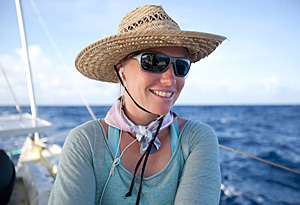We Are All Sea Creatures

Photo: Luca Babini
Whether you're reading this in an office at the top of a skyscraper in an urban metropolis or while looking out of your kitchen window over the corn fields of Iowa, you're still indebted to the ocean. Jo Royle, skipper of the Plastiki—a boat made of 12,500 recycled plastic bottles—pays homage to that "beautiful deep blue" and urges you to fight to save it.
The ocean covers more than 72 percent of the planet, drives the world's weather systems and creates more than half of the oxygen we breathe. As such, it forms an absolutely crucial part of our very existence and everyday life on earth. As the skipper of the Plastiki, my relationship with the ocean is very apparent. As I write this, I am in the middle of the Pacific, just a few degrees south of the Equator, under the shade of a reclaimed sail, listening to the Plastiki's inner workings and her 12,000 recycled plastic bottles moving through the waves. We are half-sailing, half-drifting our way from San Francisco, across one of the world's largest expanses of ocean, toward Australia.I have been a professional sailor most of my working life, taking lessons from the ocean on how to respect our planet and respond to an ever-changing environment. I have learned from experience that the moment you turn your back on Mother Nature, she will be sure to remind you of who is boss. As a sailor, it's easy to visualize how our survival is directly linked to the ocean. However, there was one very clear moment when it really dawned on me how little respect we, as humans, have for our life support system. It dawned on me that if I treated my boyfriend in the same way as we treated the ocean, he would no longer be around.
A few years ago, I realized a childhood dream, a voyage only a handful of sailors had successfully achieved: to circumnavigate South Georgia and visit the Antarctic. After a couple of weeks sailing along the northern shores, it was time to turn the corner. We began exploring the south side of the island, the windward facing shores of the notorious hostile Southern Ocean. Next stop: the Antarctic continent, a land that no nation claims and no human can permanently inhabit.



